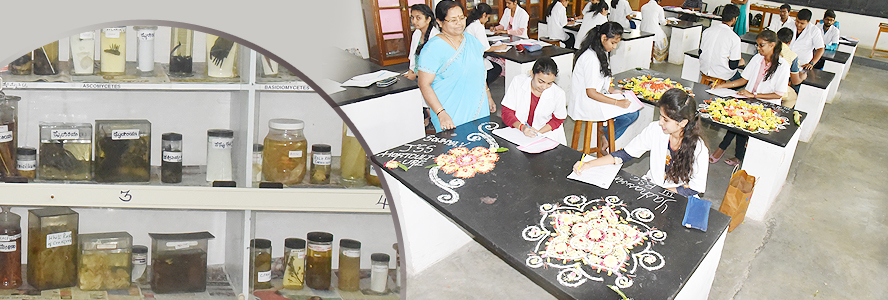Botany - The plant science permeases over everyday life. Department of Botany was established in 1964 with B.Sc. CBZ combination. The classes are commenced effectively from day one during beginning of the semester and syllabus is completed within term days / strict adherence to the Academic calendar. Experiments are standardised. Manuals are designed to support the curriculum. Effective translation of the curriculum is by efficient faculty members using live and preserved specimens, herbaria, charts, POP models, Permanent slides and photographs.
Contact Details Of HOD :
Name: N Gayathridevi
Phone No.:8050684736
Email:[email protected]
- To comprehend functional categories in plant sciences.
- To develop a strong foundation in fundamental science for scientific understanding.
- To develop and promote scientific literacy among students.
- To equip young generation with aptitude and respect for nature.
- To create the student awareness about conservation and sustainable use of plants.
- To facilitate students for taking up and shaping a successful career in Botany
- (NEP)- I B.Sc, II B.Sc, III B.Sc - Chemistry-Botany, Botany-Zoology,
- Add on Course in Horticulture.
Eligibility for Admission:
Passed candidates of science stream of 12th class/ 2nd PUC/any equivalent exams
COC in Horticulture:
Any student pursuing BSc degree preferably in natural science subjects.
Programme Objectives:
- Curriculum development: The study of Botany is vital as plants are fundamental parts of life on earth. The curriculum for the BSc Botany programme has been designed with an aim of encouraging the growing demands and challenging trends in the educational scenario. It targets the intellectual, professional and personal development of the student, rolling out globally ready individuals in the fast pacing world.
- Academic orientation: To develop an aptitude towards science and nature. To create a scientific attitude to make students open minded, critical and curious. Expose students to the diversity amongst life forms from primitive to highly evolved. To develop skill in practical work, experiments, equipments and laboratory use. To equip the students with basic skills in identifying and naming the different plants.
- Social Interaction: To inculcate social interaction through the skills related to field visits and botanical tours.
- Effective Citizenship: To develop the ability for the application of acquired knowledge in various fields of life so as to make our country self sufficient.
- Ethics: To appreciate and apply ethical principles to biological science research, studies and daily life.
- Environment and Sustainability: To make the students aware of natural resources & environment and the importance of conserving it. Sensitizing the students for keeping the environment clean and To facilitate students for taking up and shaping a successful career in Botany
- To comprehend functional categories in plant sciences.
- To develop a strong foundation in fundamental science for scientific understanding.
- To develop and promote scientific literacy among students.
- To equip young generation with aptitude and respect for nature.
- To create the student awareness about conservation and sustainable use of plants.
- To facilitate students for taking up and shaping a successful career in Botany
The main goal of the BSc degree in any subject is to develop a deeper understanding of natural laws, inquiring about the reasons and logics which govern them through established methods of observation, modelling, experimentation and calculations. This makes BSc degree a very important weapon in the society and opens a plethora of opportunities for future studies, research as well as lucrative employment opportunities across the globe.
Ravikumar B. M.
Career opportunities (job opportunities) for BSc CBZ & BBM
- BSc Botany offers a bright future to eligible candidates
- The Botany graduates can find employment opportunities in Biotechnology firms, Herbal product companies, research organizations. They can get employed in non scientific sectors in addition to scientific sectors. They can seek out for career in Government Corporation, banking and finance sectors, hospitality sector, journalism, animation, computer technology, management and so on.
- Apart from this science graduates can also find jobs in IT industry, business, BPO, marketing and so on.
- They have wide range of options available in terms of subjects, topics, fields and associated area. BSc graduates can opt to join a post graduate level degree programme in their respective field or ailed subject to peruse further studies.
- Teacher in primary and High Schools
- Developing Nursery /Nursery supervisor/manager (Entrepreneurship)
- Mushroom cultivation (Entrepreneurship).
- Lab technician
- RFO/ forest officers
- Adviser to grow advanced crop (Biotech crop).
- Assisting for Ayurvedic doctors.
- Medicinal plants Marketing (Entrepreneurship).
- R & D Botany, Biotechnology, Ayurvedic and Pharmaceutical Lab
- Forest guard, Wild life watch guard
- Wild life photographer
- Regular conduction of Botanical tours and field visits.
- Participation of both faculty and students in Suttur jatra “Krishi Brahamanda” of Krushimela for enlightening the keen & enthusiastic vistors and progressive farmers.
- Horticulture shows comprising floral, vegetable, grains & mixed rangoli and eye catching vegetable carvings.
- Community and Extension services like Plant Authentication for the needy research students of in house sister departments, PG students and students of other institutes.
Important Activities of the Department:
- Students of the department are invited to present their work related to the theme of the event in the form of Rangoli, Flower arrangement or Fruit art, in COC Horticulture.
- Students counselling.
- Use of digital/ repository facilities for teaching.
- Botanical tours
- Providing lab manuals and notes to the students prepared by the faculties with simplified concepts.
Infrastructure and activities:
- Physiological, Ecological, Botanical, horticultural and Microbiological apparatus and equipments.
- Establishment of herbal medicinal garden.
- In house identification of plants.
- Hands on skill for plant identification and culturing of required laboratory specimens.
- Harbouring 700 and odd Preserved dried and glass embedded specimens and Herbaria.
- Physiological, Ecological, Botanical, horticultural and Microbiological apparatus and equipments.
- Our own practical manuals made suitable to autonomous syllabi.
- Interactive and argumentation learning.
- Introduction of teacher-guardian system, where in the teacher monitors the progress of the student in studies & extracurricular activities and provide necessary counselling and support.
- Identification of deficiencies of each student at the time of entry and providing additional input by way of home assignments and extra care during practical classes.
- Compiling past examination questions and question papers along with scheme and making them available to students.
- Periodical visits to natural plant habitats and documentation and Awarding and motivating scholarly students.
Infrastructure Facilities:
Total number of Class Rooms: 04
Laboratories: 02
Museum: 01
Learning Resources:
- Highly motivated dedicated teaching faculty
- Charts
- Museum specimens (Preserved Dry & Wet) models, glass embedded specimens.
- Live specimens procured by skilled laboratory supporting staff
- Herbarium
- Botanical garden and nursery.
- Department Computer with internet facilities
- Modern instruments purchased out of grants provided by management.
- Botanical excursion.
- Departmental library
- Well equipped laboratory.
Additional Details:
- Regular participation of our well trained students in “ Krishi Brahmanda”- a mega agricultural educative programme to thousands of farmers at Suttur jatra festival since 2014-2015.
- The department takes initiatives for overall development of students and give them practical orientation and technical knowledge to inculcate skills which help them to face the competitive world. In this regard every year the department holds the academic field trip & Botanical tour to study the flora in different areas, accompanied by the faculty members
e-Content
2. ![]() fruits.pdf
fruits.pdf
8. ![]() Share Brief account of millets(1).pdf
Share Brief account of millets(1).pdf
9. ![]() Share Culture Media for microbes (1).pdf
Share Culture Media for microbes (1).pdf
10. ![]() Share Culture Media for microbes.pdf
Share Culture Media for microbes.pdf
11. ![]() Share Culture Media for microbes.pdf
Share Culture Media for microbes.pdf
12. ![]() Share MICROBIAL DIVER- new(3).pdf
Share MICROBIAL DIVER- new(3).pdf
13. ![]() Share Origin of cultivated plant. vavilov(1).pdf
Share Origin of cultivated plant. vavilov(1).pdf
14. ![]() Share significace of microorganisms.pdf
Share significace of microorganisms.pdf
15. ![]() Share Sterilization methods(1).pdf
Share Sterilization methods(1).pdf
16. ![]() Spices NOTES.pdf
Spices NOTES.pdf
17. ![]() SUGARCANE-pdf
SUGARCANE-pdf
18. ![]() TEA.pdf
TEA.pdf




